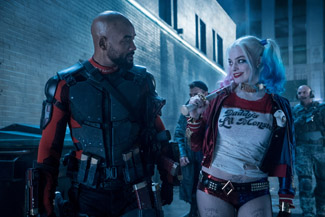|
|
Movie Review: Suicide SquadBy Ben GruchowAugust 8, 2016
Looking at the results of this in hindsight, we are given some perspective: there was a scant path available for this film to ever be more than mediocre. It’s been patched together from two competing visions, utilizing two schools of stylistic influence that are utterly at odds with each other: Christopher Nolan’s punishing sound-and-music aesthetic, workable in the context of a pragmatic and adult-anchored actorly presence, and Zack Snyder’s overwhelming CG-and-slow-motion sensibility stapled to a positively juvenile approach to narrative and character. Smash these two together, and you end up with something that is loud, self-serious, visually overbearing, tonally arrhythmic, brain-dead, and occasionally - almost by accident - compositionally startling. This is more or less what we get with Suicide Squad, a film that possesses part of a first act, most of a final act, and almost none of a middle act. In that first act, we are introduced to Deadshot (Will Smith) and Harley Quinn (Margot Robbie), the first of a crowd of antiheroes recruited by a shadowy arm of the U.S. government, headed up by Amanda Waller (Viola Davis) and supervised by Rick Flag (Joel Kinnaman). The goal of the Suicide Squad is, I guess, to prevent the advent of an evil being with the same powers as Superman (a government official asks in the beginning: “What would we do if Superman flew down one day and tore the roof off of Congress?”, having not been informed that a regular guy with access to a bomb was able to vaporize a Capitol building relatively easily scant months prior). It’s not particularly clear what the goal is, with the Squad being made up of the viciously homicidal, the insane, or both; none of them does much that couldn’t be accomplished with a flamethrower wielded by a tactical strike team of the non-homicidally insane.
|

|
|
|

|
Thursday, October 31, 2024
© 2024 Box Office Prophets, a division of One Of Us, Inc.


